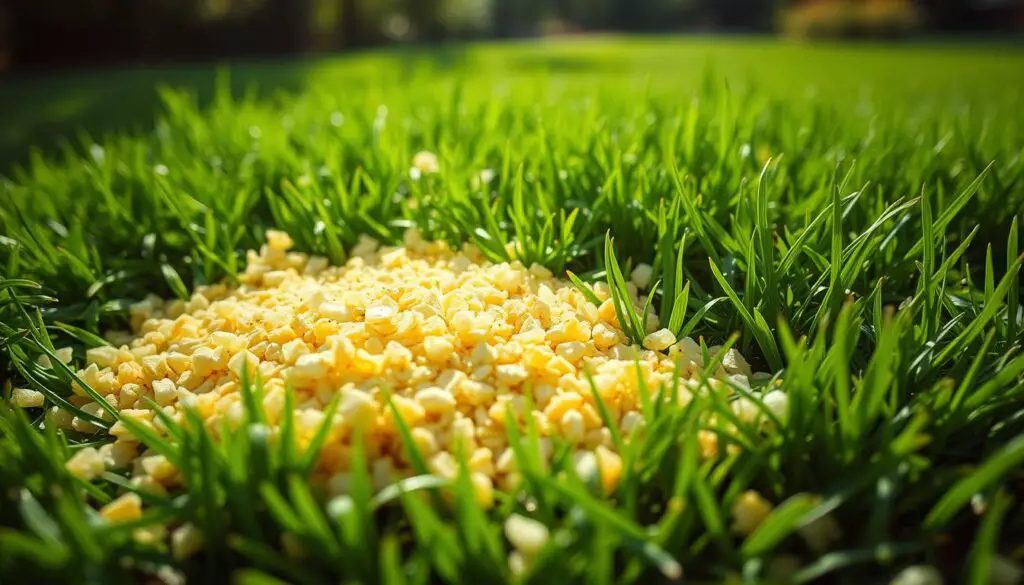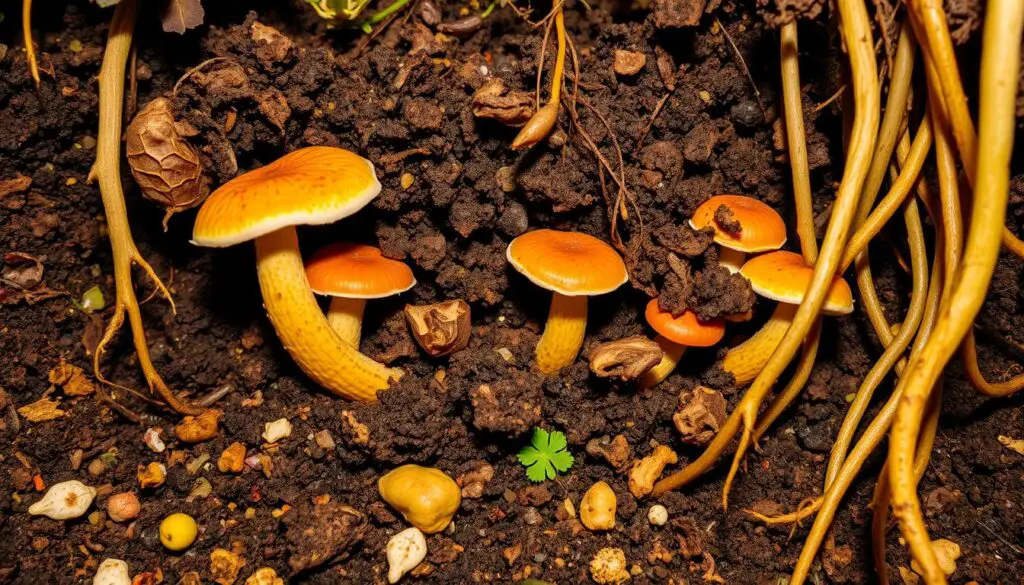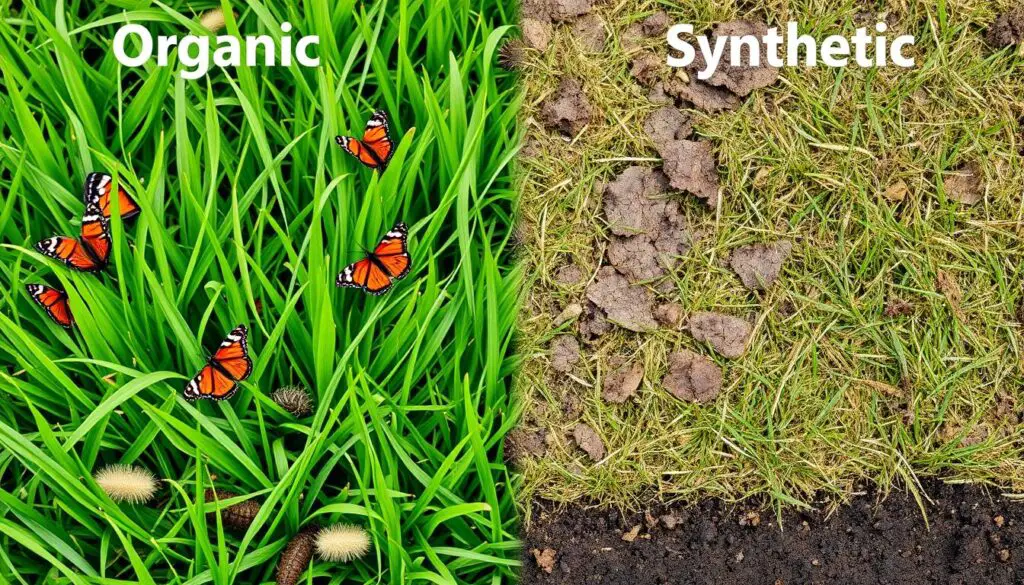Synthetic vs Organic Lawn Care Products: What You Need To Know

Organic lawn care can make a big difference in your lawn’s health and sustainability. While synthetic lawn care products offer quick results, organic lawn care promotes long-term health.
Did you know the global organic fertilizer market is expected to hit $20 billion by 2027?
This shows a big change in how people want to care for their lawns. They’re looking for eco-friendly and natural ways to keep their lawns green and healthy. Let’s explore the differences between organic and synthetic lawn care products together.
Key Takeaways
- Organic and synthetic lawn fertilizers have the same key nutrients, but they come from different places.
- Synthetic fertilizers make lawns look good fast, but organic ones help soil health over time.
- Too much thatch from synthetic fertilizers can harm your lawn’s health and structure.
- Organic fertilizers boost soil life, which helps with nutrient flow and lawn strength.
- Using a mix of organic and synthetic lawn care can save money and be better for the planet.
Understanding Organic Fertilizers
Choosing between organic and synthetic fertilizers is key for a healthy lawn. Organic fertilizers come from natural sources. They offer many benefits that synthetic fertilizers don’t.
What is Organically Derived Fertilizer?
Organic fertilizers are made from natural, carbon-containing materials like plant, animal, or fish byproducts. They are certified by the Organic Materials Review Institute (OMRI) for organic use. Unlike synthetic fertilizers, they slowly release nutrients into the soil. This helps with healthy root growth and a strong turf.
Natural fertilizers in organic lawn care improve soil quality and encourage healthy root growth.
Benefits of Organic Fertilizers
- Improve soil structure and foster the growth of beneficial soil microbes
- Provide a controlled intake of nutrients, potentially reducing long-term maintenance costs
- Offer secondary and micronutrients often absent in synthetic fertilizers
- Reduce greenhouse gas emissions and are more environmentally friendly
- Safe for kids and pets to play on lawns treated with organic products
Organic fertilizers might cost more at first. But they can make your lawn less dependent on synthetic products. This helps keep the soil and plants healthy for a long time. Natural fertilizers release nutrients slowly, feeding your lawn over time without harming soil health.
“Choosing an organic fertilizer can help promote healthy soil by improving soil structure and fostering the growth of beneficial microorganisms.” – Richard, ecology expert
When picking an organic fertilizer, think about its nutrient content, how much to use, soil pH, and the brand’s reputation. By choosing organic fertilizers, you can have a lush, healthy lawn. You’ll also help make your outdoor spaces more sustainable.
The Drawbacks of Synthetic Fertilizers
Synthetic fertilizers are popular for their fast results. But, they have downsides. They quickly green up your lawn but the effect doesn’t last long. The quick results of synthetic fertilizers can harm your grass and upset the soil’s natural balance.
What is Synthetically Derived Fertilizer?
Synthetic fertilizers are made from chemicals, often using fossil fuels. They give a quick boost of nitrogen, phosphorus, and potassium. But, they don’t help the soil’s natural life or its long-term health.
One big problem with synthetic fertilizers is they dissolve easily in water. This can pollute groundwater and local waterways, causing algae blooms and harming the environment. They also lack many important nutrients, which can make the soil unbalanced and deplete it of natural resources.
| Pros of Synthetic Fertilizers | Cons of Synthetic Fertilizers |
|---|---|
| Faster acting results | High water solubility leading to leaching |
| Easy to handle and apply | Lack of diverse micronutrients |
| Inexpensive compared to organic options | Potential to disrupt natural soil balance |
| Favored by commercial growers for crop speed | Require more frequent application |
While synthetic fertilizers offer quick fixes, their long-term effects on soil and the environment are concerning. Organic fertilizers are a better choice for those wanting to care for their lawn and the ecosystem.

Thatch Buildup: A Major Issue with Synthetic Fertilizers
Using synthetic fertilizers on your lawn can lead to a big problem: thatch buildup. Thatch is a layer of dead organic matter between the soil and grass. Too much thatch can harm your lawn.
Synthetic fertilizers, like those with fast-release nitrogen, make organic matter grow faster. This imbalance causes thatch to build up quickly. This can lead to many problems for your lawn.
- Increased susceptibility to localized dry spots
- Reduced tolerance to cold temperatures
- Elevated disease and insect problems
- Diminished effectiveness of pesticides and other treatments
It’s important to fight thatch buildup for a healthy lawn. Experts suggest aerating the soil to help break down organic matter. Also, using organic fertilizers can help control thatch buildup.
| Factors Contributing to Thatch Buildup | Impact of Thatch Buildup |
|---|---|
|
|
Knowing how synthetic fertilizers cause thatch buildup helps you manage it. This way, you can have a lush, healthy lawn for years.
“Excessive thatch can have negative physical and biological effects on the soil profile, including increased localized dry spots, reduced tolerance to cold temperatures, increased disease and insect problems, and reduced pesticide effectiveness.” – Sam, lawn expert and author here
Improving Soil Health with Organic lawn care
Organic lawn care minimizes the need for synthetic lawn care products, making lawns safer for families and pets. Many homeowners love a lush, green lawn. But how we care for our lawns affects our soil’s health. Organic lawn care is a green way to feed the grass and the soil.
Organic Fertilizers and Soil Microbes
Organic fertilizers are key in organic lawn care. They come from plants and animals and work well with the soil. They’re different from synthetic fertilizers because they help soil microbes grow.
Soil microbes are important for breaking down organic matter. They turn it into nutrients that plants can use. Using organic fertilizers over time makes the soil healthier and better at breaking down organic matter.
| Organic Fertilizers | Synthetic Fertilizers |
|---|---|
| Increase soil organic carbon, amino sugars, and lignin | Do not significantly alter lignin and soil organic carbon concentrations |
| Improve soil structure and stimulate micro-organisms | Can increase microbial biomass and amino sugar production |
| Promote long-term soil health | Less beneficial for long-term soil health |
Organic lawn care is a chemical-free gardening approach that benefits both your lawn and the environment. Choosing organic fertilizers helps your lawn and the soil’s microbes. This is key for a healthy, green lawn.
“Organic matter makes up about 5% of native soil in nature, while about 50% is composed of air and water, and 45% consists of minerals such as sand, silt, and clay.” – Laura, soil and lawn health specialist

Longevity: Organic vs Synthetic Fertilizers
In lawn care, how long fertilizers last is key. Organically derived fertilizers might not have as high a NPK analysis as synthetic ones. But they feed plants for a longer time. This makes organic fertilizers’ effect on lawns subtle yet lasting.
Synthetic fertilizers, being water-soluble, quickly feed plants. They make lawns green fast. But this green fades faster than with organic fertilizers, needing more frequent use to keep lawns looking good.
Organic fertilizers release nutrients slowly, matching grass and plant growth. This slow release helps lawns stay green longer. Synthetic fertilizers, though, can cause lawns to grow quickly then decline, needing constant application.
“Organic fertilizers not only nourish grass but also support soil microorganisms, promoting a sustainable and environmentally friendly ecosystem.” – Sam, author of Mower’s Guide
Organic fertilizers also improve soil health over time. They help grow beneficial microorganisms. This leads to a strong, nutrient-rich soil that holds moisture and nutrients better, keeping lawns healthy longer.
In the end, organic fertilizers mean a stronger, easier-to-care-for lawn. It needs less help and care over time. While organic lawn care might not show immediate results, its long-term benefits are worth it for a sustainable, eco-friendly lawn.
The Importance of Soil Structure and Texture
Keeping your lawn’s soil healthy is key. Soil structure is how particles are arranged, and texture is the mix of sand, silt, and clay. These affect how well your lawn absorbs water, holds nutrients, and grows strong grass.
For a great lawn, aim for soil with 45% sand, clay, and silt, making it loam. Loam soil is good at holding moisture but also drains well. It should be crumbly and easy to break down for a healthy lawn.
Adding organic matter helps soil a lot. Fertilizers like compost or aged manure boost soil microbes. These microbes turn organic matter into nutrients plants can use. They also make soil better over time.
| Soil Characteristic | Ideal Range |
|---|---|
| Sand, Clay, and Silt Ratio | Approximately 45% |
| Organic Matter | Around 5% |
| Pore Space for Air and Water | 50% |
| Soil pH | 6.0 to 7.0 |
Synthetic fertilizers give plants a quick fix but don’t help soil health long-term. A mix of organic and synthetic inputs is best for a strong, lasting lawn.

Understanding soil structure and texture helps improve your lawn. Try dethatching, aerating, and adding organic matter. With the right care, your lawn will be lush and vibrant for years.
Nutrient Availability: Organic vs Synthetic
In lawn care, the choice between organic and synthetic fertilizers often comes down to nutrient availability. Organically derived fertilizers may have a lower NPK analysis than synthetic ones. Yet, they provide a wider range of secondary and micronutrients. These are key for long-term plant health and soil fertility.
Organic fertilizers release nutrients slowly. This lets plants absorb them at a pace they can use.
This slow release prevents nutrient runoff and keeps your lawn well-nourished. In contrast, synthetic fertilizers are water-soluble. They give plants a quick boost of nitrogen, phosphorus, and potassium.
| Organic Fertilizers | Synthetic Fertilizers |
|---|---|
| Typically have a lower NPK analysis | Come in various fast-acting forms |
| Provide secondary and micronutrients | Lack secondary and micronutrients |
| Release nutrients slowly over time | Provide a quick nutrient boost |
| Stimulate beneficial soil microorganisms | Do little to improve long-term soil health |
Synthetic fertilizers are handy for a quick lawn fix. But for a healthier, more resilient lawn, organic options are better. The goal is to find a balance between organic and synthetic fertilizers to meet your lawn’s needs.

Organic fertilizers derived from animal or plant waste products are more sustainable and have a smaller carbon footprint than their synthetic counterparts.
Environmentally Friendly Lawn Maintenance
Organic lawn care involves natural fertilizers that improve soil quality over time.
We’re working hard to make our landscapes greener and more sustainable. Choosing between organic and synthetic lawn care products is key. Organic fertilizers are a better choice, leaving a smaller carbon footprint and improving soil and turf health.
Organic fertilizers don’t have waste products like synthetic ones do. Everything in the bag is good for the soil and your lawn. This reduces harmful runoff and protects nearby waterways, making your lawn care eco-friendlier.
To make your lawn care even greener, try these tips:
- Use organic insecticides like pyrethrin, neem oil, spinosad, and insecticidal soaps. They’re safer for bees and other beneficial insects.
- Encourage natural pest control by welcoming assassin bugs and spiders. They help keep insect numbers in check.
- Try organic herbicides made from botanical oils, acetic acid, special soaps, and corn gluten meal. They’re better for the environment than regular products.
- Hand-weed in the spring when weeds are young. It’s a cheap and effective way to keep your lawn weed-free.
- Add compost to your lawn to boost soil health and cut down on fertilizer needs.
- Water your lawn less often and in the early morning. This encourages deeper roots and makes your lawn more drought-resistant.
- Plant native plants that need less water and care. They help create a more sustainable landscape.
By following these eco-friendly lawn care tips, you can lower your carbon footprint, support biodiversity, and grow a healthy lawn. Your lawn will be in perfect harmony with nature.
| Eco-Friendly Lawn Care Practices | Benefits |
|---|---|
| Organic Fertilizers | Improved soil health, reduced environmental impact |
| Organic Insecticides | Safer for beneficial insects like bees |
| Natural Pest Control | Promotes a balanced ecosystem |
| Organic Herbicides | Less harmful to the environment |
| Hand Weeding | Cost-effective and efficient |
| Compost Addition | Enhances soil health and reduces fertilizer needs |
| Proper Watering | Promotes drought-resistant lawns |
| Native Plants | Require less water and maintenance |
By adopting these eco-friendly lawn care practices, you can grow a healthy lawn. You’ll also reduce your environmental impact and help create a more sustainable landscape.
Striking the Right Balance: Combining Organic and Synthetic
As a homeowner, I’ve found that both organic and synthetic fertilizers have their perks. Mixing them might be the smartest way to get a lush, healthy lawn. This way, I get the benefits of both worlds.
Organic fertilizers are great for the long run, improving soil health and supporting good microbes. Synthetic fertilizers, on the other hand, work fast and help control weeds and pests. Using both in lawn care keeps my yard green and eco-friendly.
For example, I start with organic, slow-release fertilizer to boost soil health and water retention. Then, I use synthetic products as needed to tackle weeds and pests. This mix ensures my lawn thrives while being kind to the environment.
FAQ
What is the difference between organically derived and synthetically derived fertilizers?
What are the benefits of using organic fertilizers?
What are the drawbacks of synthetic fertilizers?
How does thatch buildup relate to the use of synthetic fertilizers?
How do organic fertilizers improve soil health?
How do the nutrient release patterns differ between organic and synthetic fertilizers?
Why is soil structure and texture important for lawn health?
How do organic and synthetic fertilizers differ in terms of nutrient availability?
What are the environmental benefits of using organic fertilizers?
How can a combination of organic and synthetic fertilizers be used effectively?
Source Links
- https://www.joshuatreeexperts.com/blog/what-kind-of-lawn-fertilizer-is-best-organic-synthetic-granular-liquid
- https://turfgator.com/traditional-lawn-care-organic-lawn-care/
- https://lawnsquad.com/organic-vs-synthetic-fertilizer/
- https://naturalawn.com/inside-scoop/alternative-fertilizers
- https://www.lawnstarter.com/blog/lawn-care-2/guide-organic-lawn-care/
- https://greenspherelawn.com/blog/the-pros-cons-of-organic-vs-chemical-fertilizers
- https://trynutripod.com/blogs/nutripod-blog/can-too-much-fertilizer-cause-excessive-thatch-buildup
- https://www.milorganite.com/blog/Lawn/improve-your-soil
- https://earthdevelopmentinc.com/how-to-pick-the-right-fertilizer-for-your-lawn/
- https://rilawncare.com/soil-structure/
- https://extension.psu.edu/soil-management-in-home-gardens-and-landscapes
- https://www.jandrpropertyservices.com/scienceofsoil/
- https://www.milorganite.com/lawn-care/organic-lawn-care/organic-vs-synthetic
- https://ultralawn.com/posts/the-great-fertilizer-debate-organic-vs-synthetic/
- https://www.consumerreports.org/home-garden/lawn-care/eco-friendly-lawn-helpers-guide-a5481150884/
- https://lawnlove.com/blog/steps-eco-friendly-lawn-care/

